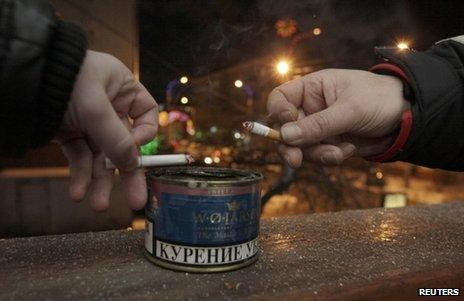Russia Duma votes to ban smoking in public spaces
- Published

An estimated 40% of Russians are smokers
Smoking in Russia will be banned from restaurants, long-distance trains and housing block entrance halls under a tough new bill passed by parliament.
Just one deputy in the State Duma voted against the legislation, which expands a 2001 smoking law.
It is now expected to be passed by the upper chamber and signed off by President Vladimir Putin.
Russia has one of the highest smoking rates in the world, with more than four in 10 Russians considered smokers.
If, as expected, the bill becomes law, the first new restrictions will come into force on 1 June.
On that date, smoking will be banned within 15m (yds) of entrances to stations, airports, metro stations and ports; in workplaces; in entrances to apartment blocks; and in children's playgrounds and on beaches.
Exactly one year later, smoking will be banned on long-distance trains and ships; in hotels; in restaurants, bars, cafes, shops and markets; and on suburban railway platforms.
Under the bill, a minimum retail price will be set for tobacco and its sale and advertising will be restricted.
The legislation meets some of the recommendations outlined in a World Health Organization report on smoking in Russia, external published in 2011.
According to that report, the retail price of a pack of 20 of the cheapest brand of cigarettes in 2010 was 11 roubles (£0.23; $0.36; 0.27 euros) while a popular Western brand sold for 48 roubles (£1; $1.6; 1.2 euros).
- Published25 March 2024
